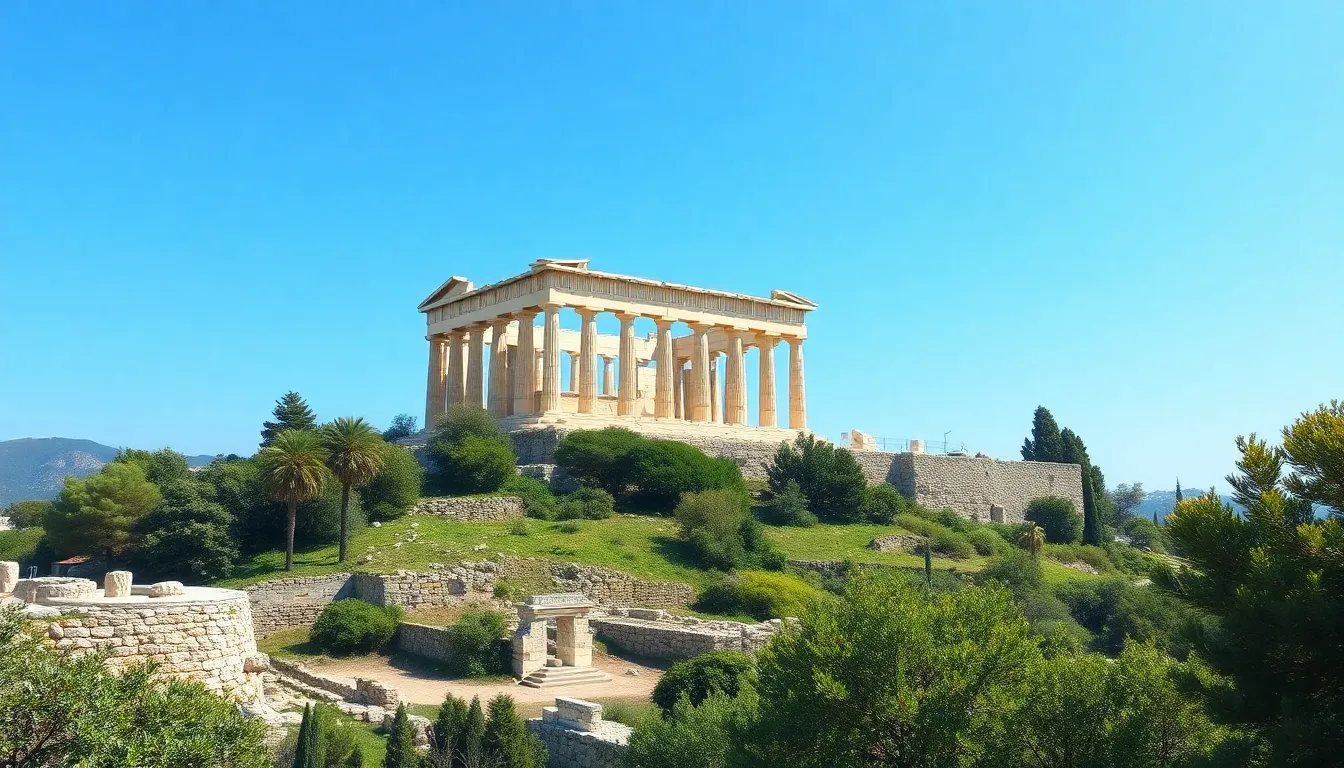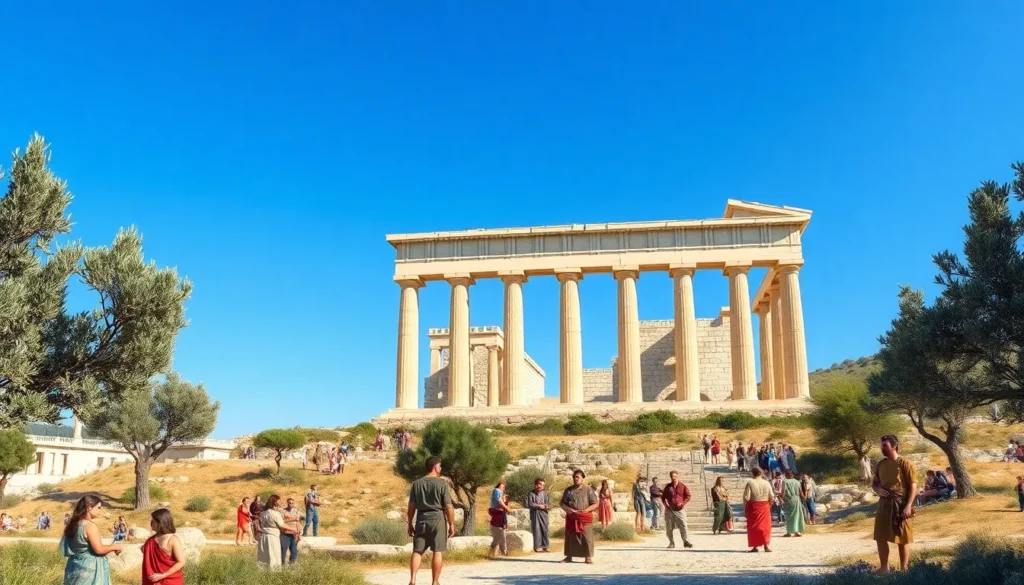Table of Contents
ToggleAncient Greece, the birthplace of democracy, philosophy, and some seriously questionable fashion choices, has captivated minds for centuries. But when exactly did this iconic civilization take its first steps? Spoiler alert: it wasn’t during a dramatic toga party.
Overview of Ancient Greece
Ancient Greece emerged as a prominent civilization between the 8th century BCE and the 6th century CE. Influenced by earlier Minoan and Mycenaean cultures, this era marked significant advancements in various fields. The establishment of city-states, known as poleis, contributed to the political landscape. Each polis, such as Athens and Sparta, developed its unique identity and governance.
Philosophy thrived during this period, with thinkers like Socrates, Plato, and Aristotle shaping Western thought. Contributions to democracy arose primarily in Athens, where citizens engaged directly in decision-making. The concept of citizenship evolved, emphasizing participation and debate.
Art and architecture also flourished, exemplified by the Parthenon and classical sculptures. These works reflected the values and ideals of the time, influencing future generations in Europe and beyond. Historians like Herodotus and Thucydides documented events, establishing the foundations of historical writing.
Trade and colonization expanded Greece’s influence across the Mediterranean. Economic growth fueled cultural exchanges, spreading Hellenistic ideas and practices. Religion played a crucial role, with a pantheon of gods like Zeus and Athena central to daily life and rituals.
Military conflicts, especially the Persian Wars and the Peloponnesian War, shaped the trajectory of Ancient Greece. These wars showcased the strength and resilience of city-states while leading to alliances and rivalries. The legacy of Ancient Greece remains evident today, seen in modern governance, philosophy, art, and science.
Timeline of Ancient Greece

Ancient Greece’s timeline spans several key periods, each marked by distinct developments in culture, politics, and society.
Prehistoric Greece
Prehistoric Greece encompasses the time before recorded history. The Minoan civilization emerged around 2600 BCE on Crete, showcasing advanced art and architecture. Following this, the Mycenaean culture arose around 1600 BCE, noted for its palatial structures and linear B script. Significant archaeological sites like Knossos and Mycenae provide insights into societal structure and trade networks. This era laid the groundwork for future Greek cultural achievements.
The Archaic Period
The Archaic Period, lasting from 800 to 500 BCE, marks a formative phase in Greek civilization. City-states or poleis began to rise, each developing its governance and identity. Innovations in art, such as black-figure pottery and monumental sculpture, reflected evolving aesthetic values. The establishment of the Olympic Games in 776 BCE signified unity among city-states through competition. Philosophical thought started to flourish with figures like Pythagoras laying the foundation for future inquiry.
The Classical Period
The Classical Period, thriving from 500 to 323 BCE, represents the zenith of Ancient Greek culture. Democracy flourished in Athens, enabling citizen participation in government. Philosophers like Socrates and Plato shaped intellectual discourse while the arts reached new heights, exemplified by the Parthenon. Significant military conflicts, including the Persian Wars and the Peloponnesian War, influenced political dynamics. This period left a profound legacy in philosophy, art, and governance, influencing Western civilization for centuries.
Key Events Leading to the Foundation
Ancient Greece’s foundation stemmed from pivotal events shaping its evolution. Key factors include geography and cultural interactions with neighboring civilizations.
The Role of Geography
Geography heavily influenced the development of Ancient Greece. Mountainous terrains led to the formation of independent city-states. Each polis, such as Athens and Sparta, developed distinct identities and governance systems. The proximity to the Mediterranean Sea encouraged trade and cultural exchange. Natural harbors facilitated maritime activities, enhancing economic growth and communication. Limited arable land also prompted city-states to expand their territories. Communities engaged with one another, forming alliances driven by geographic necessities, ultimately laying the groundwork for a unified civilization.
The Influence of Neighboring Cultures
Neighboring cultures played a crucial role in shaping Ancient Greek civilization. The Minoan civilization, thriving on Crete, introduced advanced art, architecture, and trade practices. This influence laid foundational cultural elements later adopted by the Mycenaeans. The Mycenaean period brought in distinctive writing systems, notably Linear B, which affected administration and record-keeping. Interactions with Phoenicians offered advancements in maritime technology and trade routes. Additionally, contact with Egyptians fostered developments in arts and sciences, particularly in mathematics and astronomy. These cultural exchanges enriched Greek society, driving it towards a distinctive identity.
Major City-States and Their Contributions
Ancient Greece’s city-states, or poleis, significantly shaped its cultural and political landscape through unique contributions. Two of the most prominent city-states, Athens and Sparta, exemplified contrasting philosophies and lifestyles.
Athens
Athens, often celebrated as the cradle of democracy, pioneered a system where citizens participated directly in political decisions. Artistic achievements, especially in drama and sculpture, flourished during the Classical Period. Notable figures include playwrights like Sophocles and philosophers such as Socrates. Education emphasized rhetoric, philosophy, and the arts, shaping an enlightened society. The Parthenon, a symbol of architectural brilliance, showcased Athenian values in art and civic pride. Trade flourished due to its strategic location, facilitating cultural exchange and economic prosperity.
Sparta
Sparta, in contrast, emphasized militaristic discipline and communal strength. Governance revolved around a dual monarchy and a council of elders, focusing on a warrior culture. Citizens underwent rigorous training from childhood, preparing them for military service. Social structure distinguished between citizens, helots, and perioikoi, with helots working the land for citizen benefit. Noteworthy battles, such as the Battle of Thermopylae, highlighted Spartan valor and strategic prowess. Spartan society prioritized simplicity and toughness, molding warriors who defined its legacy in Greek history.
The foundation of Ancient Greece marked the beginning of a civilization that would profoundly influence the world. Its unique city-states fostered diverse cultures and governance systems that shaped political thought and artistic expression. The legacy of Ancient Greece continues to resonate today in modern democracy, philosophy, and the arts. Understanding this rich history not only highlights the achievements of the past but also underscores the enduring impact of Greek civilization on contemporary society. As scholars and enthusiasts explore this fascinating era, the lessons and innovations of Ancient Greece remain a vital part of human heritage.







